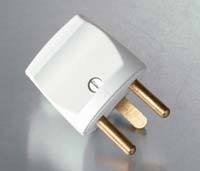If at all worried, get an electrician in. If you are confident that the electrical system is essentially safe, but uncomfortable, read on:
Some devices, particularly those which only have a two-pin mains plug (i.e. no earth connection) are allowed to 'float' at anything up to 50 volts. Because the neutral wire and the earth wire are connected at some point - depending on how the earthing arrangements are made, this is usually in the supply - then the 50 volt potential can appear on earthed metal parts, like the van bodywork.
It is most likely that what you are feeling is a 50 volt leakage, because your RCD in the vans hookup would most likely trip in case of a wiring fault. Of course, you can press the 'test' button on the RCD to double check that it is operational.
The problem then, is where is the voltage coming from?
Either you have an appliance plugged in that floats - commonly TVs, laptop power supplies, etc. Unplug everything and try again.
Or the voltage exists on the earth of the incoming power connection. You could try connecting an earthed appliance direct to the external supply. If you can detect the voltage on any earthed metal on this appliance, then the incoming supply is at fault.
Anyone with an aluminium body Apple Macbook Pro may be able to detect this effect for themselves - the power supply is only earthed if you have the Apple mains flex connected to the power supply. If you replace the mains flex with the plug that connects directly to the power supply, it isn't earthed and the Macbook's casing will have a parasite voltage on it. If you lightly rub your finger across the aluminium surface it feels oddly 'floaty' and you will feel a little tingle if you touch the mac while you are also touching something that has a good earth. I occasionally have to use two Macbooks at the same time, and I often get zapped.



















